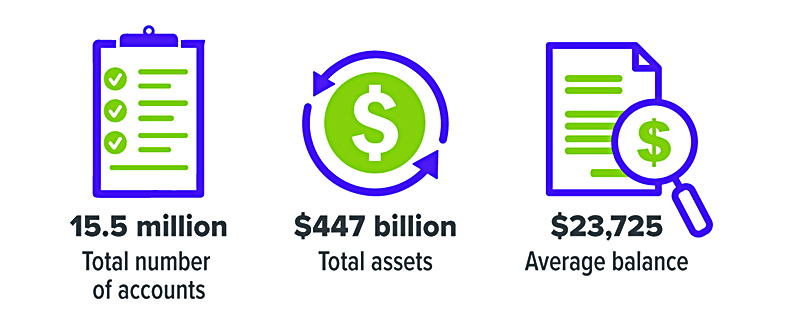Saving for College: 529 Plan vs. Roth IRA
529 plans were created in 1996 to give families a tax-advantaged way to save for college. Roth IRAs were created a year later to give people another tax-advantaged way to save for retirement. Along the way, some parents began using Roth IRAs as a college savings tool. And now, starting in 2024, extra funds in a 529 plan can be rolled over to a Roth IRA for the same beneficiary. Here's how the two options compare in a few key areas.
Contribution rules
529 plan: Anyone can open a 529 account. In 2024, individuals can contribute up to $18,000 ($36,000 for married couples) without triggering gift tax implications. And under a special accelerated gifting rule unique to 529 plans, individuals can make a lump sum contribution in 2024 up to $90,000 ($180,000 for married couples) with no gift tax implications if they elect to spread the gift over five years. Lifetime contribution limits for 529 plans are high — most plans have lifetime limits of $350,000 and up (limits vary by state).
Roth IRA: Not everyone can contribute to a Roth IRA. In 2024, single filers must have a modified adjusted gross income (MAGI) of $146,000 or less and joint filers must have a MAGI of $230,000 or less. (A partial contribution is allowed for single filers with a MAGI between $146,000 and $161,000, and joint filers with a MAGI between $230,000 and $240,000.) In 2024, the annual contribution limit is $7,000 ($8,000 for people age 50 and older).

Tax benefits
529 plan: Earnings in a 529 account accumulate tax-deferred and are tax-free when withdrawn if funds are used to pay the beneficiary's qualified education expenses, a broad term that includes tuition, fees, housing, food, and books. States generally follow this tax treatment, and some states may offer a tax deduction for 529 contributions. If funds in a 529 account are used for a non-qualified expense, the earnings portion of the withdrawal is subject to income tax and a 10% federal penalty.
Roth IRA: Earnings in a Roth IRA also accumulate tax-deferred and are tax-free if a distribution is qualified. A distribution is qualified if a five-year holding period is met and the distribution is made: (1) after age 59½, (2) due to a qualifying disability, (3) to pay certain first-time home buyer expenses, or (4) to your beneficiary after your death. If your distribution isn't qualified, the earnings portion of the withdrawal is subject to income tax and, if you're younger than 59½, a 10% early withdrawal penalty (unless an exception applies). One exception to this penalty is when the withdrawal is used to pay college expenses.
So, your age is key. Once you've met both the age 59½ and five-year holding requirements, money withdrawn from your Roth IRA to pay college expenses is tax-free. But even though withdrawing funds before age 59½ for college expenses won't trigger an early withdrawal penalty, you may owe income tax on the earnings. (Nonqualified distributions draw out contributions first and earnings last, so you could withdraw up to the amount of your contributions and not owe income tax.)
Investment options and flexibility
529 plan: You're limited to the investment options offered by the 529 plan. Plans typically offer a range of static and age-based portfolios (where the underlying investments automatically become more conservative as the beneficiary gets closer to college) with varying levels of risk, fees, and management goals. If you're unhappy with the investment performance of the options you've chosen, you can change the investment options on your current contributions only twice per year, per federal law.
Roth IRA: With a Roth IRA, you generally can choose from a wide range of investments, and you can typically buy and sell investments whenever you like (usually incurring transaction costs and fees), so they offer a lot of flexibility.
There are generally fees and expenses associated with investing in a 529 plan, as well as the risk that investments may lose money or not perform well enough to cover college costs as anticipated. The tax implications of a 529 plan can vary from state to state and should be discussed with a legal and/or tax professional. States offering their own 529 plans may provide their residents and taxpayers with exclusive advantages and benefits, which may include financial aid, scholarship funds, and protection from creditors. Before investing in a 529 plan, consider the investment objectives, risks, charges, expenses, investment options, underlying investments, and the investment company, which are available in the official disclosure statement and applicable prospectuses. Contact your financial professional to obtain a copy.
Susan H. Stewart, CPM, JD,
Senior Vice President – Financial Advisor
Senior Portfolio Manager – Portfolio Focus
NMLS #830330 through City National Bank
Individual CA License # 0M18772
RBC Wealth Management, a division of RBC Capital Markets, LLC | Firm CA License # 0C38863
Ph: (302) 493-9161 | e-mail: susan.h.stewart@rbc.com
The Stewart Group - RBC Wealth Management - Home
RBC Wealth Management, a division of RBC Capital Markets, LLC | Firm CA License #0C38863
Ph: (301) 907-2705 | e-mail: taylor.stewart@rbc.com
Investment and insurance products offered through RBC Wealth Management are not insured by the FDIC or any other federal government agency, are not deposits or other obligations of, or guaranteed by, a bank or any bank affiliate, and are subject to investment risks, including possible loss of the principal amount invested.
The information contained herein is based on sources believed to be reliable, but its accuracy cannot be guaranteed. RBC Wealth Management does not provide tax or legal advice. All decisions regarding the tax or legal implications of your investments should be made in connection with your tax or legal advisor. RBC Wealth Management is not a mortgage lender or broker. Nothing herein should be construed as an offer or commitment to lend. Any calculations are provided as educational tools, and are not intended to provide investment advice or serve as a financial plan. The result of any calculation performed is hypothetical and does not assume the effect of fees, commissions, tax rates, or changes in interest rates or the rate of inflation, and is not intended to predict or guarantee the actual results of any investment product or strategy. These results depend wholly upon the information provided by you and the assumptions utilized within. In selecting an anticipated investment return, you should consider factors affecting the potential return, such as investment objectives and risk tolerance. The articles and opinions in this advertisement, prepared by Broadridge Investor Communication Services, Inc., are for general information only and are not intended to provide specific advice or recommendations for any individual.
RBC Wealth Management, a division of RBC Capital Markets, LLC, Member NYSE/FINRA/SIPC.
RBC Wealth Management does not provide tax or legal advice. All decisions regarding the tax or legal implications of your investments should be made in connection with your independent tax or legal advisor. No information, including but not limited to written materials, provided by RBC WM should be construed as legal, accounting or tax advice.
Past performance does not guarantee future results.
Prepared by Broadridge Advisor Solutions Copyright 2024.


















































